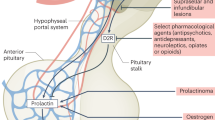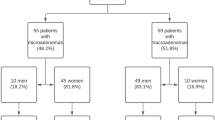Abstract
Serum prolactin concentrations were measured in 135 postmenopausal patients with advanced breast cancer prior to their treatment with one of 3 endocrine therapies: aminoglutethimide (AG), tamoxifen (T) + AG, or T + AG + danazol. The mean level of prolactin was higher, and there were more individuals with levels of prolactin greater than or equal to 500 mIUl-1, in the group of patients who did not respond to treatment. Of the patients whose disease progressed, those with prolactin levels greater than or equal to 500 mIUl-1 had a significantly shorter survival. It appears that high prolactin levels indicate a poor prognosis to endocrine therapy and the probability of a shorter than average survival time.
This is a preview of subscription content, access via your institution
Access options
Subscribe to this journal
Receive 24 print issues and online access
$259.00 per year
only $10.79 per issue
Buy this article
- Purchase on Springer Link
- Instant access to full article PDF
Prices may be subject to local taxes which are calculated during checkout
Similar content being viewed by others
Rights and permissions
About this article
Cite this article
Dowsett, M., McGarrick, G., Harris, A. et al. Prognostic significance of serum prolactin levels in advanced breast cancer. Br J Cancer 47, 763–769 (1983). https://doi.org/10.1038/bjc.1983.129
Issue Date:
DOI: https://doi.org/10.1038/bjc.1983.129
This article is cited by
-
Prolactin-induced mouse mammary carcinomas model estrogen resistant luminal breast cancer
Breast Cancer Research (2011)
-
Prolactin and Breast Cancer Etiology: An Epidemiologic Perspective
Journal of Mammary Gland Biology and Neoplasia (2008)
-
Season of tumour detection influences factors predicting survival of patients with breast cancer
Breast Cancer Research and Treatment (1990)



